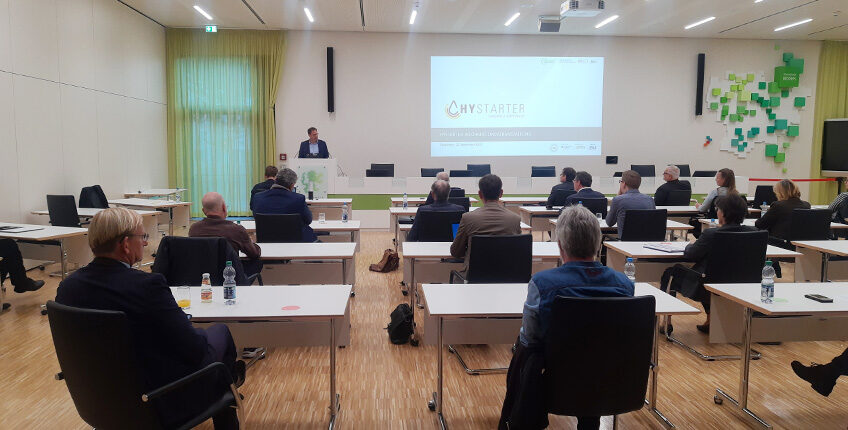Stakeholder network for the ‘HyStarter’ project provides information on the current state of play.
Göppingen, 23/09/2022 – Securing energy supply and as a consequence, securing status as an economic location was never more in focus as it is today. Green hydrogen can make a significant contribution to the climate goals of independence from fossil energies and energy imports.
Hydrogen is bound in water and therefore, exists in large quantities and is theoretically available at any time. Hydrogen can be transported lightly, efficiently, over longer distances, and it can also be stored. This means that the generation and consumption of renewable energies can be decoupled, both in terms of time and space. But green hydrogen can also itself be used to reduce emissions in the electricity, heat, mobility and industrial sectors.
To further advance this important issue for the future in the district of Göppingen, a regionally-tailored hydrogen concept is being developed with support from experts as part of the HyStarter project. The stakeholder network, comprised of representatives from industry, science, education and municipal politics, made presentations on Thursday evening in the framework of an information event for the general public.
District administrator Edgar Wolff opened the event with 70 in-person attendees as well as online participants. Mr. Wolff was delighted that the Energy Agency’s application had been successful and the district was one of 15 HyStarter regions selected nationwide. “Renewable energies play an important role in the current revision of the integrated climate concept of the district, and thus in achieving the climate protection objectives. Green hydrogen will make a major contribution here”, said the district administrator.
The global significance of green hydrogen was also underlined by former innovation officer for green hydrogen for the federal government, Dr. Stefan Kaufmann. He also warned against falling behind as a region, as many regions are already further along in terms of hydrogen application.
Participants listened with great interest to the presentations. As Thorsten Gamm from Albwerk explained, Albwerk is developing a hydrogen production concept based on existing generation plants. The goal is to successively reduce gas demand. It is planned that the production of green hydrogen by means of electrolysis as well as storage and application options will be modelled in a small showroom.
The next contributions then addressed hydrogen application options in the transport sector. As Jörg-M. Wienecke from the Office for Mobility and Transport Infrastructure for the Göppingen district reported, a framework plan is currently being worked out for public transport services by 2035. 65 per cent of all new buses are to be emission-free by 2026. Dr. Oliver Ehret, Esslingen University of Applied Sciences, showed potential prospects for the district of Göppingen, using examples from other municipalities. Esslingen University of Applied Sciences bundles hydrogen and fuel cell competencies in the Steinbeis Innovation Centre and supports municipalities nationwide in creating emission-free local public transport.
Hans-Jörg Fischer, Managing Director of Fischer in Weilheim, reported on a project already underway on hydrogen generation and utilization from the neighbouring district. An electrolyser is to be built by the end of 2024 that can produce up to 1,800 kg of green hydrogen per day in the first phase. This will then be available for buses and trucks, and also cars via a public refuelling station. An expansion of the project is planned in the direction of Göppingen/ Geislingen.
At the end of the public event, the stakeholders of the HyStarter project had a lively discussion with municipal politicians. Topics included prospects for regional added value, existing obstacles to the necessary rapid development of renewable energies, as well as options for making an impact and various stakeholder wishes. Timm Engelhardt, Managing Director of the Energy Agency for the District of Göppingen, was satisfied at the event’s conclusion: “Even if many issues remain open, it is important to bring all stakeholders to the table. Because we need the courage and trust of many players to meet the challenge of hydrogen. Only then can the establishment of a hydrogen economy in the Göppingen district be successful, which presents a huge opportunity for Göppingen as an economic location.” The HyStarter project will be completed in early 2023. The results will then be made available to the public.
HyStarter hydrogen regions:
‘HyLand – Hydrogen regions in Germany‘ is a competition launched by the Federal Ministry for Digital and Transport (BMDV) in 2019. It is coordinated by NOW GmbH and implemented by Project Management Jülich (PtJ). HyLand motivates stakeholders in all regions across Germany to initiate, plan and implement hydrogen concepts. The goal of the competition is to identify and support the most innovative and promising regional concepts. The HyStarter project in the Göppingen district is supported by the Energy Agency of the Göppingen District as well as Nuts One GmbH, in cooperation with other expert partners.
About the Energy Agency of the Göppingen District gGmbH:
The Energy Agency of the Göppingen District is the neutral and independent point of contact for all energy queries in the district of Göppingen. A non-profit, it supports, advises and accompanies citizens, businesses, municipalities, schools and childcare facilities in implementing energy and climate protection measures. Its services range from free energy consultation for citizens to municipal climate protection projects, like the creation of neighbourhood concepts.
Press contact:
The Energy Agency for the District of Göppingen (Energieagentur Landkreis Göppingen gGmbH)
Dorit Klöpfel
Telephone: +49 (0)7161 651 65 07
Email:
Homepage: www.klimaschutz-goeppingen.de
Image source: Anke Schmidt


